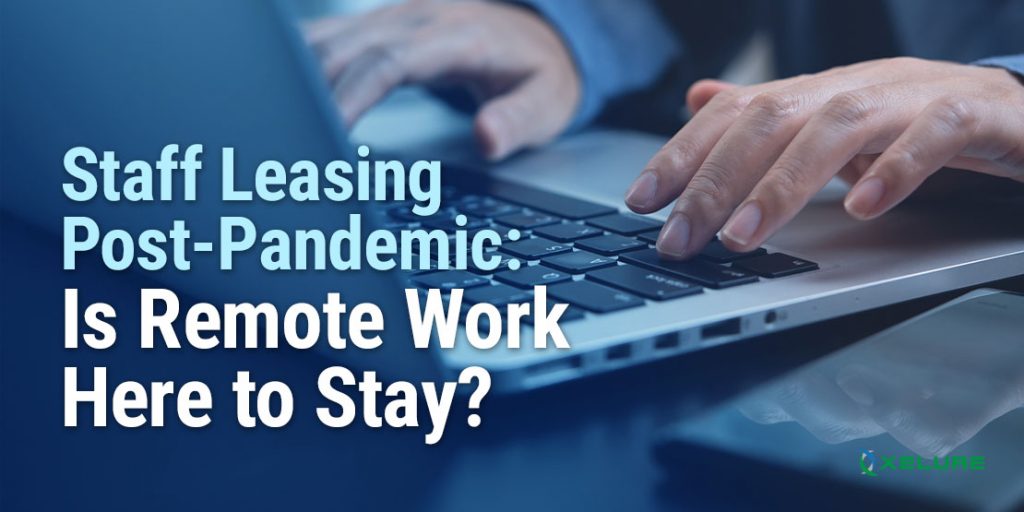Between software innovations, globalization, and the pandemic, the staffing and outsourcing industry has gone through significant shifts in recent years, and some significant trends have manifested in 2023 and beyond. In this article, we’ll talk about six of the biggest trends in the staff leasing landscape that you should keep an eye on, whether you are a company looking to outsource tasks, hiring professionals, or a digital nomad looking to sharpen your skills.
1. Remote Work Will Be a Norm in Many Industries
One of the biggest impacts of the COVID-19 pandemic is the so-called ‘pajama revolution’, that is, the big shift to remote work across various industries. Where it used to be a niche staffing model that only applied to customer service and freelance creatives, remote work is likely to continue and become a go-to option for both established companies looking to keep costs down or startups looking for an efficient way to scale up.
In relation to the growing preference for remote work and being able to tap into the global pool of talent, staff leasing for specialized skills will also likely take center stage. Companies are no longer looking to merely outsource certain business processes; they are looking for the right hires with specialized skills that fill the company’s specific needs. From the employees’ point of view, various studies have shown that workers prefer working from home, and that they are finding it more productive, creative, and less stressful than traditional office setups.
2. Demand for Higher Level Positions and Specialized Talent Will Rise
Analysts are predicting that high-level positions and roles requiring specialized skills will be in higher demand and will continue to be outsourced moving forward. The main reason is that outsourcing opens access to a global pool of skilled workers where specialized talent may not have been available in-house, especially with some studies suggesting that US-based companies are finding it hard to find niche talent within the country.
During the pandemic years, outsourcing has proven to be an effective solution to address the skills gap, as it gives companies access to a broader pool of talent with the qualifications they really need. This can be particularly important for companies operating in high-tech industries or those looking to adopt new technologies or business models.
Consequently, finding workers with specialized skillsets and who are adept in new technologies is expected to become a big priority for staff leasing providers and outsourcing hotspots like the Philippines and India. A big shift is expected in terms of what weighs heavily towards successful job applications—recruiters are expected to shift from prioritizing traditional bachelor’s degrees to skill-based certifications and practical competencies.
3. Business Continuity and Quality Will Become Top Priorities
In relation to the previous trends, businesses who outsource are also expected to prioritize continuity both in relation to staff leasing providers and to their remote workers. Where companies used to work with multiple providers to fill various roles, most of them now look for strategic partnerships with fewer or even only a single provider who focus on hiring workers tailored to the needs and goals of the company.
A stronger relationship with staff leasing providers also ensures higher output quality and more job security for efficient workers, both of which make goal setting and growing much easier.
4. Collaboration Software and New Technologies Will Become Integral
In 2023 and beyond, more focus will be given not only to the quality of outsourced employees, but also to the tools they use to excel at their roles.
Expect to see more use cases for emerging technologies like Artificial Intelligence (AI) tools for optimizing various business process, Robotic Process Automation (RPA) for automating manual tasks which require little to know human input, and Cloud Computing for storing and securing company data. More emphasis is also expected to be given to Cybersecurity, seeing as all outsourcing workflows are done digitally.
5. No More Annual Reviews?
As of writing, many staffing professionals and outsourcing companies are of the opinion that traditional annual reviews are passe. These days, management and HR personnel find it more effective keeping tabs on employees through regular check-ins, huddle sessions, and town hall meetings.
This can be tied to one of the previous trends mentioned, which is the development of AI tools that warrant more effective and closer monitoring between HR personnel and remote workers. Expect weekly or bi-weekly meetings to dominate the outsourcing industry in the future—it doesn’t hurt to talk about each other’s pets occasionally, after all!
6. Diversity, Equity and Inclusion
A byproduct of much of the working world embracing remote work is the growing importance of diversity in both in-person and virtual workplaces. Staffing agencies now play a vital role in connecting companies with a diverse pool of talent and engaging workplaces. A healthy work culture will continue to become more and more of a selling point for companies moving forward, perhaps even as important as salary and benefit packages.
Final Thoughts
The outsourcing industry continues to transform as of 2023, and we can only expect things like remote work and technological innovations to drive the industry moving forward. Be sure to align your company with these top trends to scale your brand better and remain competitive in this shifting landscape.





